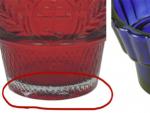Which water boils faster, salty or not? At what temperature does water boil? Dependence of boiling temperature on pressure
Boiling is the process of vaporization that occurs when a liquid is brought to the boiling point. Every person knows from his school desk that water boils at t=100˚С. But many people are interested in the question of which water boils faster: salted or fresh?
What is the boiling process?
Boiling is a rather complex process consisting of four stages:
- First stage characterized by the appearance of small air bubbles that appear both on the surface of the liquid and on the side. Their occurrence is the result of the expansion of air bubbles located in microscopic cracks in the container.
- During the second stage you can see that the bubbles increase in volume and more and more of them appear on top. This phenomenon is explained by an increase in temperature, at which the pressure on the bubbles increases. Thanks to Archimedean force, they appear on the surface. If it does not have time to warm up to the boiling point (100˚C), then the bubbles again go to the bottom, where the water is hotter. The noise characteristic of boiling is created as the size of the bubbles increases and decreases.
- At the third stage a mass of bubbles is observed, which, rising to the surface, causes short-term turbidity of the water.
- Fourth stage characterized by intense seething and the appearance of large bubbles, which, when bursting, create splashes. The latter indicate that the water has boiled. Water vapor appears, and the water makes sounds characteristic of boiling.
Fresh water boiling
Boiling water is water brought to a boil. During this process, abundant steam formation occurs, which is accompanied by the release of free oxygen molecules from the boiling liquid. Due to prolonged exposure to high temperatures, microbes and pathogenic bacteria. Therefore, if the quality of tap water is poor, it is undesirable to consume it raw.
Fresh but hard water contains salts. During boiling, they form a coating on the walls of the kettle, which is more often called scale. Boiling water is commonly used to prepare hot drinks or disinfect fruits or vegetables.
When salt water boils
Experiments show that the boiling point of salt water is higher than the boiling point of fresh water. Therefore, we can conclude that fresh water boils faster. Salt water contains chlorine and sodium ions, which are found among the water molecules. Between them, the process of hydration occurs - the addition of water molecules to salt ions.
It is worth noting that the hydration bond is much stronger than the water intermolecular bond. Therefore, during boiling fresh water the vaporization process begins faster. A liquid with salts dissolved in it requires a little more energy to boil, which in this situation is temperature.
When it increases, molecules in salt water move much faster, but their number decreases, which means they collide less often. This is what can explain the smaller amount of steam - after all, its pressure is less than that of fresh water. To achieve greater than atmospheric pressure in salt water and begin to boil, a higher temperature is required.
Another justification
When cooking, many housewives salt the water at the beginning of the process, citing the fact that it will boil faster this way. And some find an explanation for why salt water boils faster, based on school knowledge physics course, namely topics related to heat transfer. As is known, heat transfer occurs three types: heat transfer characteristic of solids, convection, which is present in gaseous and liquid bodies, and radiation.
The latter type of heat transfer exists even in space. This is confirmed by the stars and, of course, the sun. But still the main factor in this issue density is considered. Since salt water has a higher density than fresh water, it boils faster. At the same time, it takes more time to freeze. Consequently, with a denser liquid, heat transfer will be more active and boiling will occur faster.
Boiling water at reduced pressure: Video
To cook food faster, most housewives add salt to the pan before the water begins to boil. In their opinion, this will speed up the cooking process. Others, on the contrary, argue that tap water boils much faster. To answer this question, you need to turn to physical and chemical laws. Why does salt water boil faster than normal water, and is this really true? Let's find out! Details in the article below.
Why salt water boils faster: physical laws of boiling
In order to understand what processes begin to occur when a liquid is heated, you need to know what scientists mean by boiling process technology.
Any water, regular or salty, begins to boil in exactly the same way. This process goes through several stages:
- small bubbles begin to form on the surface;
- increase in the size of bubbles;
- their settling to the bottom;
- the liquid becomes cloudy;
- boiling process.
Why does salt water boil faster?
Proponents of salted water say that when heated, the theory of heat transfer is triggered. However, the heat released after destruction molecular lattice, does not have much effect. Much more important technological process hydration. At this time, strong molecular bonds are formed. So why does salt water boil faster?

When they become very strong, it is much more difficult for air bubbles to move. It takes a long time to move up or down. In other words, if there is salt in the water, the process slows down air circulation. As a result, salt water boils a little slower. Air bubbles are prevented from moving by molecular bonds. That's why it doesn't boil faster than unsalted.
Or maybe you can do without salt?
The debate over how quickly salt water or tap water boils can go on forever. Looking at the practical application, big difference will not be. This is easily explained by the laws of physics. Water begins to boil when the temperature reaches 100 degrees. This value may change if air density parameters change. For example, water high in the mountains begins to boil at temperatures below 100 degrees. At home the most important indicator becomes the power of the gas burner, as well as the heating temperature of the electric stove. The speed of heating of the liquid, as well as the time required for boiling, depends on these parameters.
On a fire, the water begins to boil after a few minutes, since burning wood produces much more heat than a gas stove, and the heated surface area is much larger. From this we can draw a simple conclusion: to achieve rapid boiling, you need to turn on the gas burner at maximum power, and not add salt.

Any water begins to boil at the same temperature (100 degrees). But the boiling speed may vary. Salty water will begin to boil later due to air bubbles, which make it much more difficult to break molecular bonds. It must be said that distilled water boils faster than regular tap water. The fact is that in purified, distilled water there are no strong molecular bonds, there are no foreign impurities, so it begins to heat up much faster.
Conclusion
The boiling time for regular or salt water differs in a few seconds. It does not have any effect on the speed of cooking. Therefore, you should not try to save time on boiling; it is better to start strictly observing the laws of cooking. To make the dish tasty, it needs to be salted at a certain time. This is why salt water does not always boil faster!
Many housewives, trying to speed up the cooking process, salt the water immediately after putting the pan on the stove. They firmly believe that they are doing the right thing, and are ready to bring many arguments in their defense. Is this really so and which water boils faster - salty or fresh? To do this, it is not at all necessary to carry out experiments in laboratory conditions; it is enough to dispel the myths that have reigned in our kitchens for decades with the help of the laws of physics and chemistry.
Common myths about boiling water
On the issue of boiling water, people can be divided into two categories. The former are convinced that salt water boils much faster, while the latter absolutely disagree with this statement. The following arguments are given in favor of the fact that it takes less time to bring salt water to a boil:
- the density of the water in which the salt is dissolved is much higher, so the heat transfer from the burner is greater;
- When dissolved in water, the crystal lattice of table salt is destroyed, which is accompanied by the release of energy. That is, if in cold water add salt, the liquid will automatically become warmer.
Those who refute the hypothesis that salt water boils faster argue this way: when salt dissolves in water, a process of hydration occurs.
At the molecular level, stronger bonds are formed, which require more energy to break. Therefore, salt water takes longer to boil.
Who is right in this debate, and is it really so important to salt the water at the very beginning of cooking?
The boiling process: physics at your fingertips
To figure out what exactly is happening with salty and fresh water When heating, you need to understand what the boiling process is. Regardless of whether the water is salty or not, it boils the same way and goes through four stages:
- the formation of small bubbles on the surface;
- an increase in the volume of bubbles and their settling at the bottom of the container;
- cloudiness of the water caused by the intense movement of air bubbles up and down;
- The boiling process itself is when large bubbles rise to the surface of the water and burst noisily, releasing steam - the air that is inside and heats up.
The theory of heat transfer, to which supporters of salting water at the beginning of cooking appeal, “works” in this case, but the effect of heating the water due to its density and the release of heat when the crystal lattice is destroyed is insignificant.
Much the process is more important hydration, during which stable molecular bonds are formed.
The stronger they are, the more difficult it is for an air bubble to rise to the surface and fall to the bottom of the container; this takes longer. As a result, if salt is added to the water, the circulation of air bubbles slows down. Accordingly, salt water boils more slowly because molecular bonds hold air bubbles in salt water a little longer than in fresh water.
To salt or not to salt? That is the question

Kitchen disputes over which water boils faster, salted or unsalted, can be waged endlessly. Ultimately, from the point of view practical application it doesn't make much difference whether you salted the water at the very beginning or after it boiled. Why doesn't this have special significance? To understand the situation, you need to turn to physics, which provides comprehensive answers to this seemingly difficult question.
Everyone knows that with standard atmospheric pressure at 760 mm mercury water boils at 100 degrees Celsius. Temperature parameters can change subject to changes in air density - everyone knows that in the mountains water boils at a lower temperature. Therefore, when it comes to the household aspect, in this case, such an indicator as the intensity of combustion of a gas burner or the degree of heating of an electric kitchen surface is much more important.
The heat exchange process, that is, the rate of heating of the water itself, depends on this. And, accordingly, the time it takes for it to boil.
For example, on an open fire, if you decide to cook dinner over a fire, the water in the pot will boil in a matter of minutes due to the fact that wood, when burned, releases more heat than gas in the stove, and the heating surface area is much larger. Therefore, it is not at all necessary to salt the water in order for it to boil faster - just turn on the stove burner to maximum.
The boiling point of salt water is exactly the same as that of fresh water or distilled water. That is, it is 100 degrees at normal atmospheric pressure. But the boiling rate at equal conditions(for example, if a regular gas stove burner is used as a basis) will vary. It will take longer for salt water to boil due to the fact that it is harder for air bubbles to break stronger molecular bonds.
By the way, there is a difference in boiling time between tap and distilled water - in the second case, a liquid without impurities and, accordingly, without “heavy” molecular bonds, will heat up faster.
True, the time difference is only a few seconds, which does not make a difference in the kitchen and has virtually no effect on the speed of cooking. Therefore, you need to be guided not by the desire to save time, but by the laws of cooking, which prescribe salting each dish at a certain moment in order to preserve and enhance its taste.
Why does salt water boil faster than fresh water?
The issue is resolved and closed.
Where do tears come from? Below the frontal bones of the skull, directly above and slightly behind the eye, is the almond-shaped lacrimal gland. From this gland, about a dozen tear ducts lead to the eye and eyelid. When we blink, the lacrimal gland is stimulated, and tears wash the eye. This way, the eye remains moisturized and clean. Tears are sterile and contain enzymes that destroy bacteria, thereby protecting the eyes from infection.
When we cry, a small percentage of moisture is lost through evaporation, but the bulk goes to the inner corner of the eye, flowing down the two tear ducts into the peanut-shaped lacrimal sac, and then into the nasolacrimal duct, where the tears are absorbed into the nasal cavity. . Therefore, if you cry a lot, your nose often becomes stuffy.
The baby is not able to produce tears until he is 6-8 weeks old.
Tear fluid contains sodium, calcium and chlorine ions, bicarbonates. To protect the eye from microbes that fall on its surface, tears contain lactoferrin, immunoglobulin A, as well as iron, copper, magnesium, calcium, phosphate ions, lactates, citrates, ascorbates and amino acids.
It happens, sometimes I crave salty foods, and sometimes I really want something sweet :)
you can fry anything, but how you like it, idk
http://informacija.lv/ru/uznemeji/veselība-un-skaistumkopšana/tetovēšana/
hangover? lack of potassium.. and minerals in the body..
Salt water boils at more than high temperature than fresh water, respectively, under the same heating conditions, fresh water will boil faster, salt water will boil later. There is a whole physico-chemical theory why this is the case, but it can be explained “on the fingers” as follows. Water molecules bind to salt ions - the process of hydration occurs. The bond between water molecules is weaker than the bond formed by hydration. Therefore, a fresh water molecule is more easily (at a lower temperature) separated from its “surroundings” - i.e. roughly speaking, it evaporates. And in order for a water molecule with dissolved salt to “escape from the embrace” of salt and other water molecules, more energy is required, i.e. high temperature. This is simplified; in general, the theory of solutions is a rather abstruse thing.
In one case you eat to satisfy your hunger, in the other you engage in gluttony)
Rainwater is basically distilled water. But if above the cities there are evaporations from all sorts of chemical plants and landfills, then the rain, having absorbed this “chemistry”, itself becomes chemical. For example, if someone burned a tire, sulfur oxide was released. This sulfur oxide, absorbed into water, becomes sulfurous acid. And this acid will already corrode everything it hits, except glass, of course. But after it eats away, the remains will be salt. Then the rain will be salty, but after hitting objects.








 What was their strength and what was their weakness?
What was their strength and what was their weakness? Snow, frost, ice in the freezer?
Snow, frost, ice in the freezer? Management presentation on organization
Management presentation on organization Osh events. Osh conflict. There is a war going on - the Great Kyrgyz Patriotic War
Osh events. Osh conflict. There is a war going on - the Great Kyrgyz Patriotic War